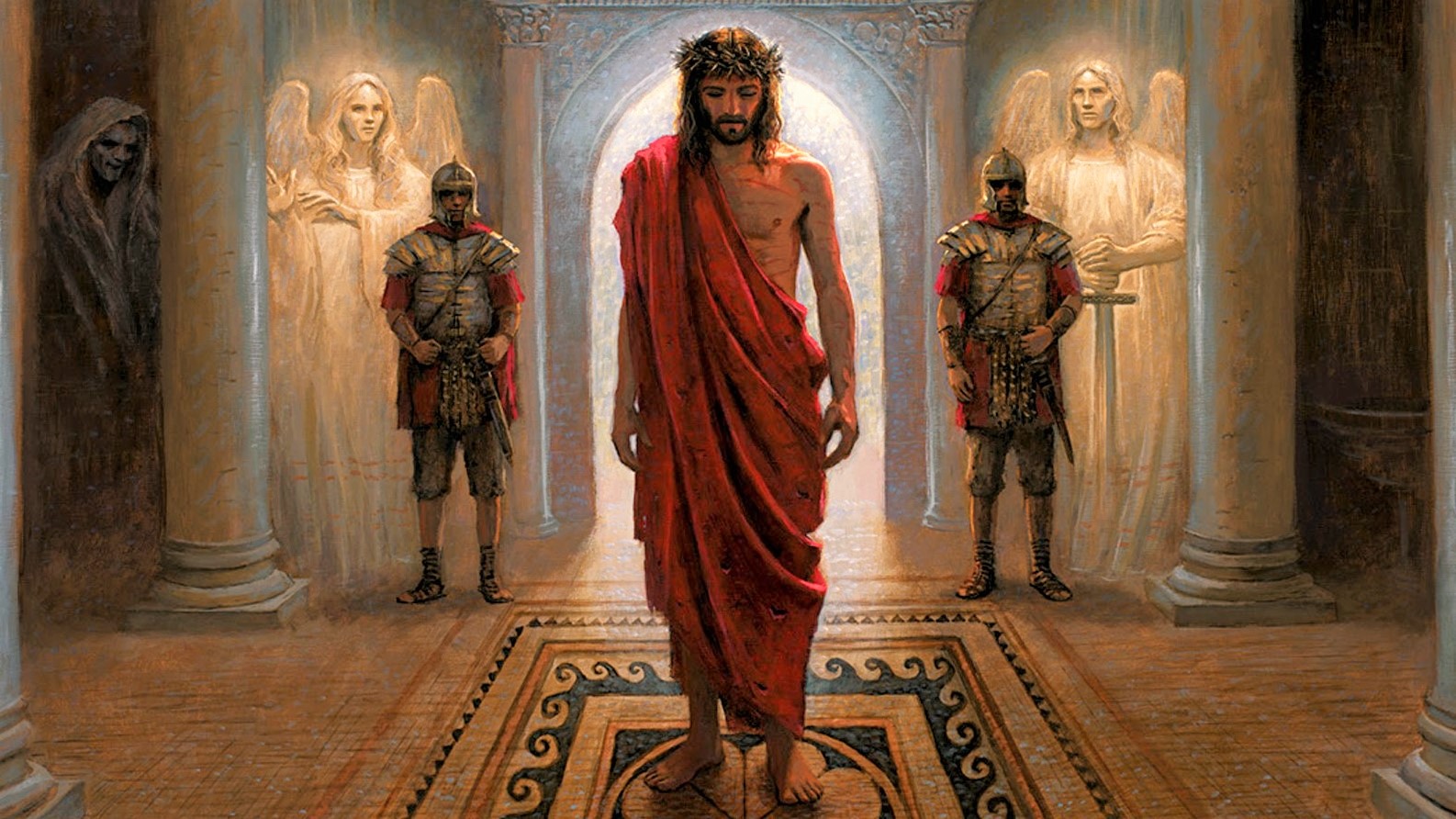Leading Like Jesus

by Pastor Gene
Power and authority are often put for the same thing, but they’re very different. Many mothers, for instance, often have very little power, but have tremendous authority. While love will cause you to lose power, leaving you vulnerable – as it does – to hurt, it will give you something far greater than power; it will give you authority. The authority of love.
Power is a cheap substitute for authority, just as sex is a cheap substitute for love.
Max Weber was an intricate thinker and a brilliant sociologist. He was born in 1865 in Erfurt, Germany. He was a “voracious reader with an encyclopedic knowledge.” Even as a young boy, he had an extensive knowledge of the Greek classics, and was “fluent in such philosophers as Kant, Goethe, and Spinoza before entering college.” This breadth of knowledge clearly set him apart from many other social thinkers of his age and gave his work a dense complexity. Turns out, he had a lot to say about the difference between power and authority (see especially, Weber, The Theory of Social and Economic Organization, 1947).
The most important difference between power and authority is this: while power is the ability to coerce someone to act, authority is the ability to convince someone to act willingly.
Power is the ability to force you to do my will. If I can make you do what I want you to do, I have power. Authority, however, is the ability to get you to do what I want you to do willingly, without coercion or force. Authority implies freedom to act; power implies force or coercion.
In Matthew chapters 5-7, we find Jesus so-called, Sermon on the Mount – the most beautiful sermon ever preached. Matthew 7:28-29 says, “when Jesus finished these sayings, the crowds were astonished at his teaching, for he was teaching them as one who had authority, and not as their scribes.”
Authority.
Then, at the very end of Matthew’s Gospel, we have our Lord’s last words to His disciples before He ascended into Heaven: “And Jesus came and said to them, “All authority in heaven and on earth has been given to me. Go therefore and make disciples …” (Matthew 28:18-19a).
Authority. There’s that word again.
So, power and authority are not the same things. While power is energy, authority is the right to use that energy. For example, Satan has fantastic power, but his authority to use it is limited by God.
The Greek word translated ‘authority’ in our English text (ἐξουσία) means, among other things, “the right to act, the ability to do something.”
The word is used in Romans 9:21, where Paul asks, “Does not the potter have a right (ἐξουσία) over the clay, to make from the same lump one vessel for honorable use and another for common use?” The answer is, ‘Of course He does!’ The ‘right’ to act is the ‘authority’ to act. And God has the ultimate authority.
And here’s the thing about authority: all legitimate authority is delegated, with the exception of God’s own authority.
Consider what Paul says about civil authorities. “Let every person be subject to the governing authorities. For there is no authority except from God, and those that exist have been instituted by God. Therefore, whoever resists the authorities resists what God has appointed, and those who resist will incur judgment” (Romans 13:1-2).
Q. So where do governments get their authority?
A. From God.
Or consider this exchange between Pilate and Jesus: “[Pilate] entered his headquarters again and said to Jesus, “Where are you from?” But Jesus gave him no answer. So Pilate said to him, “You will not speak to me? Do you not know that I have authority to release you and authority to crucify you?” Jesus answered him, “You would have no authority over me at all unless it had been given you from above … From then on Pilate sought to release him” (John 19:9-11a, 12a).
Q. Where did Pilate get his authority?
A. From God.
So, Jesus told His disciples, “All authority in heaven and on earth has been given to me. Go therefore and make disciples of all nations,” and we go. We obey.
But why do we obey Him?
Because of His power? Because of coercion or force?
No, not at all! We obey Him willingly because of the love He’s shown us.
Which brings up another important point: authority comes through love. That’s why many moms, powerless as they may be, have great authority with their children.
In his book, The Power Delusion, Christian Sociologist Tony Campolo tells the story of two Philadelphia mobsters who on one occasion confronted the governor of the state. During the ugly event, captured on live television, the brothers were yelling at the governor who was visibly intimidated. Suddenly, out of the crowd stepped a little old Italian lady who walked up to the fearsome mobsters and said, “You and you, go home!” The boys instantly turned and left.
Who was this woman? Of course, it was their mother. That little lady had absolutely no power, but she had plenty of authority. And these two giants of the Philadelphia underworld backed off and said, “Alright, ma, alright.”
Now, how did this fragile old lady get those two goons to obey her so immediately and so willingly? Love had given her authority over them.
She had spent most of her life sacrificing for those boys. Loving them, protecting them, nursing them back to health when they were sick, cooking for them. And that love, played out over decades, had given her unimaginable authority over them. Years of love had earned her the authority of immediate obedience.
It’s no wonder, then, that Jesus said, “All authority in heaven and on earth has been given to me,” because no one has ever loved like He loved/loves us. And that love has earned Him the greatest possible authority in our lives.
He says, ‘Go,’ and we go! We long to obey Him, long to please Him – but not because of His power, not because of force or coercion. We obey Him willingly because His love has earned Him that authority in or hearts.
“We love Him because He first loved us” (1 John 4:19).
And those who love with God’s love – their husband or wife or children or neighbor or even their enemy – will find they possess something far greater than mere power.
To consider …
- Jesus challenged His disciples with a whole new model of how to lead others.
He said, “You know that the rulers of the Gentiles lord it over them, and their great ones exercise authority over them. It shall not be so among you. But whoever would be great among you must be your servant, and whoever would be first among you must be your slave, even as the Son of Man came not to be served but to serve, and to give his life as a ransom for many” (Matthew 20:25-28).
Reflect upon this and the way you seek to influence people in your own life.
How does your approach line up with what Jesus is calling for?
What is revolutionary about Jesus’ teaching here?
How does this teaching run against our nature?
- Leaders in the church especially are to always be careful to lead with humility, because, as Peter wrote, “God opposes the proud but gives grace to the humble.” Pastors, then, are admonished to “shepherd the flock of God that is among you, exercising oversight, not under compulsion, but willingly … not domineering over those in your charge, but being examples to the flock. And when the chief Shepherd appears, you will receive the unfading crown of glory” (1 Peter 5:2-5).
Why do you think God demands this kind of leadership in His Church?
Notice Peter’s insistence that Christian leadership be free of coercion or force – “not under compulsion, but willingly … not domineering over those in your charge, but being examples to the flock.”
How does this apply to the distinction between power and authority described above?
In being “examples to the flock,” one might ask, examples of what? (Answer: Christlikeness).
If you are a parent with a ‘little flock’ at home, do you think God expects a different kind of leadership from you than He expects from a pastor?
Likewise, if you are an employer, or have people under you, do you think God expects a different kind of leadership from you than He expects from a pastor?
Do you possess authority (willing influence) in someone’s life that was born out of love?
- Have you ever experience the destructive effects of power?
What did you learn from that experience?
Have you ever seen it in a church?
How did it effect you as a follower of Jesus?
Recommended Posts
Comments
Comments are closed.




I had a supervisor one time, De Hull, who demonstrated such kindness, compassion, and love for me that I always felt confident that what she assigned me, I could do. That she would not assign me a task or project that would be considered impossible or destined for failure. As a child of God I believe that that’s how He sees me, too . All that He’s assigned to me, all those He’s put in my life (people and circumstances) He has assigned fully knowing that I trust him and believe He will enable me through. Just as I loved getting up each morning and going to work for De, today I love getting up and asking God: “what do you have for me today?” and trusting that my response will be one of wonder and dependence as I live under His loving and just authority.
Lori, that’s beautiful. What a wonderful, high compliment that is to De. Hopefully, we all have someone in our own lives that we have touched so that they, too, can say the same of us!